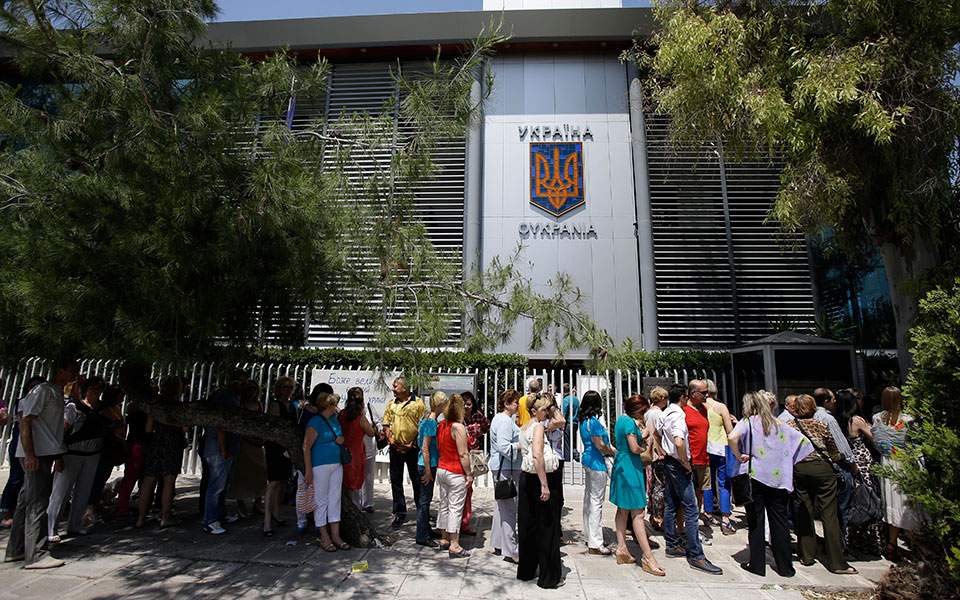Diaspora vote: Let’s not waste another chance

Roderick Beaton, an acknowledged authority on modern Greek literature and culture and the author of a biography of Greek poet-diplomat George Seferis, begins his latest book, “Greece: Biography of a Modern Nation,” with a provocative question: “Who are the Greeks? What shared experiences, collective memories, aspirations and achievements have shaped a worldwide population of some 15 million people today? Most of these live in the southeast corner of Europe in two member-states of the European Union, Greece and Cyprus, while communities can also be found in all the Earth’s inhabited continents and are known as the ‘Greek diaspora.’”
One does not need to share the British professor’s view to realize how important the diaspora is to the Greece of today. Nor does one need to have read previous studies by Greek sociologist Constantinos Tsoukalas to be informed on the decisive contribution of great benefactors as well as ordinary people of the diaspora in building schools, hospitals and all sorts of public buildings in 19th century Greece.
It is enough to think that, at least in our time, Greece is probably the only European country where the construction of the new national library and opera house was funded exclusively by private individuals.
The most important thing about Beaton’s introduction is that he treats modern-day Hellenism as a single entity. Because, ever since the debate about the rights of heterochthonous Greeks (those who had moved to the kingdom from outside) at the time of Otto, if not earlier, autochthonous Greeks (meaning those who had been born in the territory of the new state) have been inclined to believe that they are “more Greek” than the expatriates.
For this reason, they believe that they should be granted priority in the process of appointments to state jobs. It is worth noting that the National Assembly of September 3 had proposed excluding heterochthonous Greeks from the public administration. “When during the war of independence we needed them, we would open the doors,” a wise-headed deputy told the assembly. “Until yesterday we received them as the nation lacked representatives. Today […] it is turning them away.” (Session 12.1.1844)
Although a considerable number of people still raise an eyebrow over the prospect of appointing overseas Greeks to state sector jobs, mistrust toward heterochthonous Greeks nowadays mainly concerns their voting rights. In fact, that mistrust runs so deep that the Constitution stipulates that any legislation on the matter must be approved by two-thirds of the legislature (Article 51, Paragraph 4).
This means that passing the law promised by the new conservative administration would require SYRIZA’s support. But what does the leftist party think about the issue? Former interior minister Alexis Haritsis recently expressed a view that was totally over the top: By giving diaspora Greeks the right to vote in national elections, Haritsis said, New Democracy was seeking to alter the electoral body in a coup-like manner.
Does the argument hold any water? I believe that this concern is not justified for two reasons at least: First because, according to the Constitution, not all diaspora Greeks can vote in parliamentary elections but only those with Greek citizenship (and, provided that they are enrolled in some municipal registry, they can vote in Greece, if they want).
And although the Greek Citizenship Code enables an unspecified number of third-, fourth- or even fifth-generation Greeks to acquire Greek citizenship retroactively (Article 25, Law 3284/2004), as the competent authorities of the Interior Ministry would be the first to confirm, the required procedures are so time-consuming and complicated that very few people actually bother to try.
The second reason is that, particularly today, the people of the diaspora do not seem to care about party rivalries in the homeland as they did in the past. Only 15,000 Greeks living in EU member-states voted in the last European Parliament elections. In other words, the influence that overseas Greeks can have on the election results is very limited.
Diaspora voters could, however, have an excessive impact on a local level. For example, the preference of the some 200 New York-based expats from Karytaina, a mountain village in the Arcadia region of the Peloponnese, can greatly influence the election of the Arcadia MP. For this reason, the lawmaking committee formed by Haritsis a year ago at the Interior Ministry (chaired by general secretary Costas Poulakis) drafted a bill which rightly stipulated that the vote of diaspora Greeks would not count toward any particular constituency but only on the national level.
Although the counterarguments cannot be dismissed (some people would argue that expats are not so much Greek as they are Cephalonians, Chiotes or Arcadians, for example), I do believe that it would be a mistake if the election of the deputy in some small region were to hinge on the votes of individuals originating from that same district but who have for years been cut off from their homeland.
The same committee unanimously proposed that Greeks living abroad would vote by physically turning up at Greek embassies or consulates. The reasoning was that voting by post has not actually been tested in Greece and the system could run into complex technical obstacles and raise authenticity issues. Meanwhile, the committee deemed that electronic voting is still transparency-inhibiting.
The only issue that saw serious disagreement among the members of the committee concerned whether the vote of diaspora Greeks should be counted in the final election result. The majority view was negative on the grounds that doing so would give the diaspora disproportionate power over the process.
Proponents of this view say that overseas voters should be entitled to elect between three and 12 MPs (out of a total 15 candidates on a single nationwide ticket), depending on the number of expats voting in the election. Two committee members expressed a different view, claiming that such a differentiation would run against the “one person, one vote” principle, making it unfair to diaspora voters.
This is particularly the case when a country has an electoral system such as Greece’s, whereby the overall outcome determines what party gets the 50-seat bonus that is awarded to the party that wins the most votes as well as which parties enter Parliament (the 3 percent threshold).
Having participated in the sessions of the aforementioned committee, I can assure readers that with the exception of the aforementioned issue, the members agreed unanimously on a series of proposals addressing all the complex issues pertaining to the voting rights of the diaspora community. Interior Minister Takis Theodorikakos is advised to use the draft as a basis for his own bill.
As far as the aforementioned point of friction is concerned (and given that the conservative government is likely to reintroduce the 50-seat bonus abolished by the SYRIZA administration), I want to believe that SYRIZA will realize its previous mistake and not raise any obstacles to the introduction of a sound piece of legislation that would finally recognize the obvious: The heterochthonous Greeks of today must not be treated as second-class citizens.
Nikos Alivizatos is emeritus professor of law at the Faculty of Law of the University of Athens.





